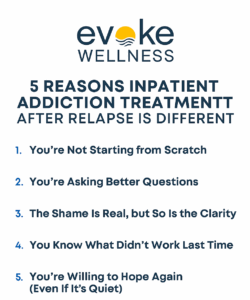Relapsing after a period of sobriety can feel like hitting the ground harder than the first time. You’re not naïve anymore. You know what recovery takes. And now, it might feel like you’ve failed not just yourself, but everyone who believed in you.
Let me say this clearly: you haven’t failed.
Relapse doesn’t erase your progress. It’s not a verdict—it’s a chapter. And for many of us, it’s the one that finally turns the page toward deeper, more sustainable healing. I know it’s hard to believe that right now. But if you’re even thinking about returning to inpatient addiction treatment, there’s a reason for that. A part of you still wants something better. That part of you matters.
So if you’re asking, “Why would it work this time?”—here’s what I’ve learned from both sides of the relapse line.
1. You’re Not Starting From Scratch
It might feel like square one. But you’ve already walked through detox. You’ve sat in groups. You’ve done the awkward introductions, faced the cravings, maybe even started rebuilding parts of your life. That knowledge doesn’t disappear just because you slipped.
Think about it this way: you’re coming back with more lived experience. You understand your triggers more deeply. You recognize patterns you couldn’t name before. That gives you a head start.
At Evoke Wellness in Columbus, Ohio, the team knows how to work with people who aren’t “first-timers.” You’re not treated like a blank slate—you’re met where you are, with respect for everything you’ve already lived through.
2. You’re Asking Better Questions
In early recovery, the questions tend to sound like:
“Can I do this?”
“Will I ever feel normal?”
But after relapse, the questions shift:
“What do I need to stay well?”
“What did I avoid last time?”
“What kind of support actually helps me?”
That shift matters.
It means you’re thinking less about performing recovery and more about living it. In inpatient care, those deeper questions get room to breathe. You’re not rushed. You’re not juggling work, family, or outside expectations. You’re in a space built for healing. And this time, the work you do can be more honest—because the stakes feel more real.
3. The Shame Is Real, but So Is the Clarity
Relapse often brings brutal self-judgment. You might feel like you’ve let people down. That you should’ve known better. That you’ll never be trusted again.
But with time, relapse can also bring clarity.
You see what didn’t work.
You recognize the red flags you waved off.
You stop sugarcoating your needs.
That clarity? It’s a gift. Painful, yes. But powerful. It can help guide every therapy session, every boundary you set, and every support you accept. At Evoke Wellness Ohio, the team doesn’t shame you for slipping—they work with that clarity to help you build something stronger.
4. You Know What Didn’t Work Last Time
This is a big one.
Maybe last time, you skipped trauma therapy.
Maybe you went home too soon.
Maybe you relied too much on willpower and not enough on community.
Whatever the gap was—you see it now. And that awareness allows for real change. An Intensive Inpatient Treatment Program in Ohio gives you the time and structure to address what got missed. That might mean diving deeper into grief work, adjusting medications, or finally confronting the emotional roots of your use.
It’s not about fixing you. You’re not broken. It’s about supporting the whole picture this time—not just the parts you were ready to show.
5. You’re Willing to Hope Again (Even If It’s Quiet)
Reading this? That’s hope.
Not loud, firework-style hope. But quiet, cautious hope. The kind that whispers, “Maybe this time.”
That’s enough to start.
The truth is, most of us don’t come back to treatment with blazing confidence. We come back tired. Scared. Unsure if we even belong. But the thing is—we do. You do. And places like Evoke are designed to welcome you at your most human, not your most polished.
Your hope matters. Even if it’s flickering. Especially if it’s flickering.
“I thought they’d be mad at me. But when I called, all they said was, ‘We’re glad you’re safe. When can we talk?’ That was the moment I knew I wasn’t alone.”
– Alumni, after returning to inpatient care
Frequently Asked Questions About Inpatient Addiction Treatment After Relapse
Is it common to relapse after 90+ days?
Yes. While 90 days is a strong foundation, addiction is a chronic condition, and relapse is a common part of many people’s recovery journey. It doesn’t mean you failed—it means something still needs support.
Will I be treated differently because I’ve relapsed?
At Evoke Wellness Ohio, relapse isn’t met with judgment—it’s met with compassion and clinical insight. Many staff members are in recovery themselves. They understand that relapse can deepen motivation and create new opportunities for healing.
How long will I stay in inpatient treatment?
Length of stay varies based on your needs. Some people benefit from 30 days, others from longer support. You’ll work with the treatment team to determine a plan that makes sense for your situation and goals.
Can I return to the same facility where I was before?
Yes—and in many cases, returning to a familiar environment with a new mindset can be beneficial. If it’s your first time at Evoke, they’ll get to know your history and meet you without judgment.
What if I’m scared I’ll relapse again?
That fear is valid. It also means you care. Inpatient treatment can help you build stronger relapse prevention tools, deepen your understanding of triggers, and strengthen your support system. Fear doesn’t disqualify you—it qualifies you for care.
Ready to Take the Next Step?
You’re not alone. If you’re considering inpatient addiction treatment after a relapse, now’s the time to reach out. Call Evoke Wellness Ohio at (866) 430-9267 or visit our intensive inpatient treatment program page to learn more.



